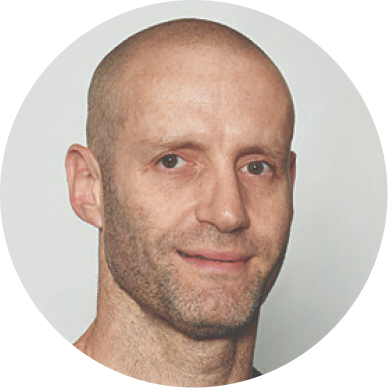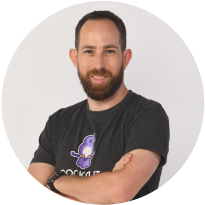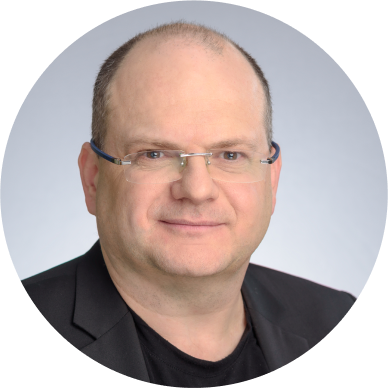1. What is a daily habit you love doing?
I always exercise first thing in the morning, for several reasons. The first is that it gives me a sense of accomplishment when the day begins. In addition, it’s something that should be turned into a ritual. I believe implementing these kinds of “rituals” is good, because by postponing it, it becomes a chore and creates a sense of frustration. It’s also important to be alert and change your exercise before it becomes boring.
2. What piece of advice would you give yourself when you started? What advice would you ignore?
My advice to myself would be to think more before deciding. This is naturally more irrelevant at the very early stages of the company but as soon as you notice signs of traction, you need to think more about your decisions, because you will be facing the consequences of your decisions, and, if they were not made correctly, it would be much harder to change their consequences along the way. We tend to emphasize several subjects when deciding, which increases our chance to make a good decision and reach our goal. However, there are subjects that might remain under the radar and result in unexpected consequences. Such consequences are more difficult to overturn afterward. It also applies the company culture.
Ignoring advice is a muscle that needs nourishing at the very early stages of a startup company. You are conducting meetings with many investors, most of them very smart and opinionated, who are not afraid to express their thoughts regarding the company. However, these investors are not familiar with the details like the entrepreneur and, therefore, their opinion should be taken into account but not decisive to your own company.
3. What piece of content (book/podcast/Ted Talk) is your favorite or has influenced your life?
It differs greatly over time. I have read the book Good to Great a couple of years back, and I found myself using a lot of examples from it throughout the years. In general, I like quotes since they’re memorable and deliver the message clearly and precisely. Two other books are Chasing Excellence and The Subtle Art of Not Giving a F*ck, these books taught me that we are becoming stronger by the challenges we choose to face.
4. What is the most valuable investment (time, money or energy etc.) that you’ve ever made?
I suppose I’m not the first person providing this answer: personal development through learning. Giving my curiosity the space to express itself. I’m not stupid, but I’m not a genius either. I’ve never been part of an education program for gifted students nor have I been a student of straight A’s in school/college. However, I am curious and have the will to go deeper into the subjects that interest me. That is what pushed me forward. Particularly today, when a lot of information is ava
5. Is there a quote, mantra or message you live your life by and that you resonate with? It can be someone else’s as well.
As I mentioned earlier, I love quotes. My favorite quote is from Mike Tyson – “Everybody has a plan until they get punched in the mouth” and throughout their existence, startups get punched in the mouth a lot. A mantra I found inspirational is “Slow is smooth, smooth is fast”. I interpret it as saying you should always move forward, regardless of the pace, because moving forward means to progress. In myopinion, it is the opposite of Paralysis by Analysis.
6. What helps you stay motivated on good and hard days?
I tend not to acknowledge the term ‘a hard day’. When there is a hard day there is always a reason. I try to isolate the reason and then try to resolve it. There is a term called “External/Internal Focus of Control”, it refers to the ability to recognize if a bad situation is under my control or not. If yes, I have to do what is necessary in order to resolve it and if not, I should not waste more time on it. I think a lot of frustration arises from trying to change situations we cannot control. On good days there is no need for a specific motivation – a good day is motivational enough.
7. What are you passionate about other than managing your own company?
As I mentioned earlier, exercise. I generally like creating and working with wood. I also love making my kids laugh. Thankfully, I am doing more programming work lately. Although it has been a few years since I wrote a code that made it to production, I enjoy doing it and it helps me think and validate my ideas.
8. What have you recently thrown away or released from your life that made a positive impact and why?
I do not criticize myself as I used to. In addition to the mental load it has taken off me, it allows me to become more open-minded and feel more comfortable expressing my opinion. The process is gradual and includes learning how to make gradual changes. When imagining the final goal, it seems far away and somewhat impossible. I compare myself to CrossFit – jumping directly to an advanced stage is hard but going step by step makes it easier. The same applies to this process.
9. Share a failure you have experienced and what you learned from it.
A failure is really a crossroad allowing you to choose – when you are willing to learn from it, it becomes a lesson. It is the same with regrets – they are also a crossroad allowing you to make the right decision in order to reach the goal of minimum regrets.
I am an optimistic person in nature, and that is why I don’t dwell on failures but look at them as an opportunity to learn and as another step towards success. It seems that is exactly what I learned unconsciously – that you can learn from every failure and plan your way to success.
10. If you could have anyone in the world answer these questions who would it be and why?
I would choose Paul Graham, founder of Y-Combinator and, in my opinion, one of the smartest people in the world. His ability to express himself in writing is fantastic, and I have been greatly inspired by his articles.
*Want to read about another Founder? Click here to read about Yali Saar, Founder of Tailorbrands.







